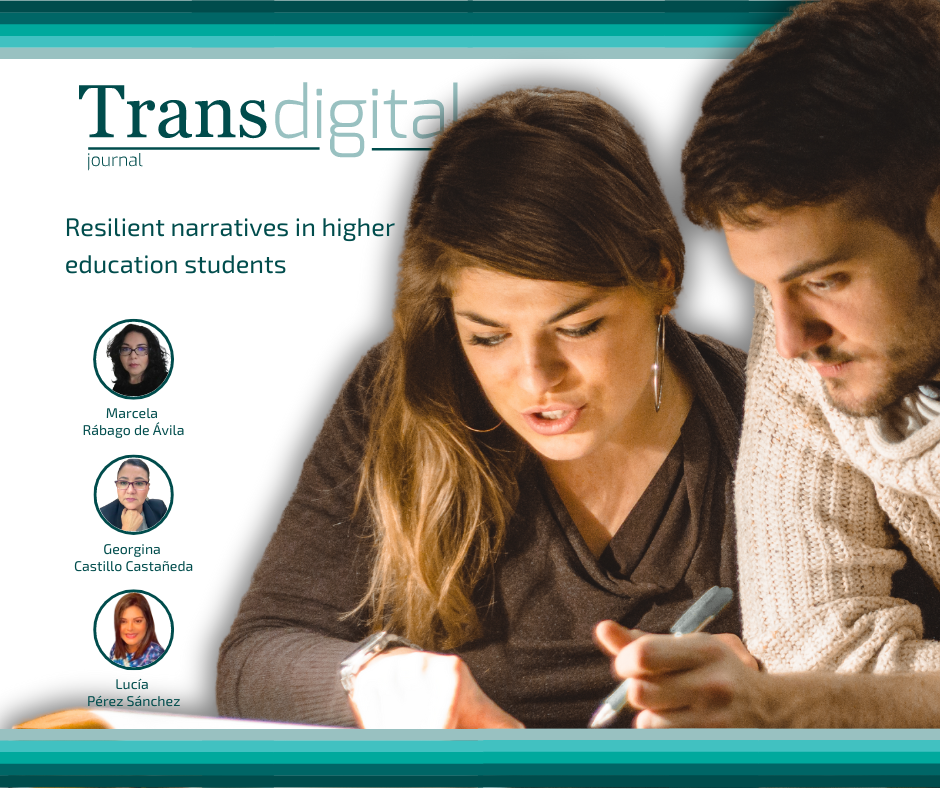Resilient narratives in higher education students
DOI:
https://doi.org/10.56162/transdigital324Keywords:
resilience, university students, narrative practicesAbstract
The present research focused on the recovery of resilient skills in psychology students at the Autonomous University of Nayarit, México (UAN) through a workshop based on the proposal of Henderson and Milstein, and the narrative practices of White and Epston. It was considered that resilience is not an individual trait, but rather a social construction that develops through interaction with the environment. A qualitative methodology was used, with a phenomenological design and exploratory scope. The sample was made up of seven psychology students from the UAN who voluntarily participated in a four-session workshop. Data collection was carried out through a focus group and the conversations were analyzed in depth. Students identified and constructed alternative stories to victimization or failure. The importance of significant figures in the development of resilience, and the transmission of values and coping strategies, was recognized. The stories that students constructed about themselves had a significant impact on the way they faced difficulties. The workshop allowed students to develop resilient skills by recovering alternative stories, identifying significant figures, and understanding the importance of stories in building resilience. This work shows that resilience is a factor that is built socially and not internally and individually.
References
Becoña Iglesias, E. (2006). Resiliencia: definición, características y utilidad del concepto. Revista de Psicopatología y Psicología Clínica, 11(3), 125–146. https://doi.org/10.5944/rppc.vol.11.num.3.2006.4024
Bernal, L. (2016). Educar para la resiliencia [Tesis de pregrado, Universidad de la Laguna].
Betina Lacunza, A., & Contini de González, N. (2011). Las habilidades sociales en niños y adolescentes. Su importancia en la prevención de trastornos psicopatológicos. Revista Fundamentos en Humanidades, 12(23), 159-182.
Caldera, J., Aceves, B., & Reynoso, Ó. (2016). Resiliencia en estudiantes universitarios. Un estudio comparado entre carreras. Psicogente, 19(36), 227-239. http://doi.org/10.17081/psico.19.36.1294
Campos Aguilar, S. (2018). Resiliencia en la escuela: Un camino saludable. Apuntes de Ciencia & Sociedad, 8(1). https://doi.org/10.18259/acs.2018002
Carey, M., Walther, S., & Russell, S. (2010). Lo ausente pero implícito. Un mapa para apoyar el interrogatorio terapéutico. Procesos psicológicos y sociales. 6(3). 1-24.
Chase, S. E. (2015). Investigación narrativa. Multiplicidad de enfoques, perspectivas y voces. En N. K. Denzin & Y. S. Lincoln (Eds.), Manual de investigación cualitativa Vol IV. Métodos de recolección y análisis de datos (58-112). Gedisa.
Choque-Larrauri, R., & Chirinos-Cáceres, J. L. (2009). Eficacia del Programa de habilidades para la vida en adolescentes escolares de Huancavelica, Perú. Revista de Salud Pública, 11(2), 189-181.
Costa, L. del C., Perlo, C. L., & Lopez Romorini, M. V. (2017). Las conversaciones productivas como estrategia para generar relaciones colaborativas en contextos organizativos: El caso mutual. Revista Iberoamericana de psicología, 9(2), 72–84. https://reviberopsicologia.ibero.edu.co/article/view/rip.9206
Denborough, D. (2008). Collective Narrative Practice. Responding to individuals, groups, and communities who have experienced trauma. Dulwich Centre Publications.
Denzin, N. (2003). Foreword: narrative’s moment. En M. Andrews, S. Sclater, C. Squire & A. Treacher (Eds.), Lines of narrative (11-13). Routledge.
Echeburúa, E., De Corral, P., & Amor, P. J. (2005). La resistencia humana ante los traumas y el duelo. En W. Astrudillo, A. Casado de la Rocha & C. Mendinueta (Eds.), Alivio de las situaciones difíciles y del sufrimiento en la terminalidad (337-359). Sociedad Vasca de Ciudadanos Paliativos.
Echeburúa, E. (2004). Superar un trauma: el tratamiento de las víctimas de sucesos violentos. Pirámide.
Gamboa, S. (2005). Juego-Resiliencia, Resiliencia-Juego: Para trabajar con niños, adolescentes y futuros docentes. Bonum.
Gil, G. E. (2010a). La resiliencia: conceptos y modelos aplicables al entorno escolar. El Guiniguada, 19, 27-42.
Gil, G. E. (2010b). Los procesos holísticos de resiliencia en el desarrollo de identidades autorreferenciadas en lesbianas, gays y bisexuales [Tesis Doctoral Universidad de Las Palmas de Gran Canaria].
Gracia, E. (1997). El apoyo social en la intervención social y comunitaria. En E. Gracia (Ed.), El apoyo social en la intervención comunitaria (19-51). Paidós.
Grotberg, E. H. (1996, 24-28 de julio). The International Resilience Project: Findings from the Research and the Effectiveness of Interventions [Sesión de congreso] 54th Annual Convention of the International Council of Psychologists, Edmonton, Canadá.
Grotberg, E. H. (2006). La resiliencia en el mundo de hoy: Cómo superar las adversidades. Gedisa.
Henderson, N., & Milstein, M. M. (2005). Resiliencia escolar. Paidós.
Hernández-Sampieri, R., Fernández-Collado, C., & Baptista- Lucio, P. (2014). Metodología de la investigación (6ª ed). McGraw Hill.
Limonero, J. T, Tomás-Sábado, J., Fernández-Castro, J., Gómez- Romero, Mª. J., & Ardilla-Herrero, A. (2012). Estrategias de afrontamiento resilientes y regulación emocional: predictores de satisfacción con la vida. Psicología Conductual, 20(1), 183-196.
Luengo Rocha, C. (2008). Redes de apoyo y capacidad de resiliencia: su importancia en la recuperación de pacientes accidentados laborales. Revista electrónica de trabajo social. Universidad de Concepción. 7 (1-9).
Melillo, A., & Suarez, E. (comps.) (2008). Resiliencia: Descubriendo las propias fortalezas. Paidós.
Ncube, N. (2006) The Tree of Life Project: Using narrative ideas in work with vulnerable children in Southern Africa. International Journal of Narrative Therapy and Community Work, 1, (3-16).
Payne, M. (2002). Terapia narrativa. Una introducción para profesionales. Paidós.
Sánchez Arias, G. (2016). Programa de intervención terapéutica en resiliencia en una institución de educación superior. Revista de Psicología Universidad de Antioquia, 8(1), 49–64.
Tarragona, M. (2013). Psicología positiva y terapias constructivas: una propuesta integradora. Terapia Psicológica, 31(1), 115-125.
White, M. (2015). Práctica narrativa: la conversación continua. Pranas.
White, M. (2016). Mapas de la práctica narrativa. Pranas.

Downloads
Autor de correspondencia
El autor de correspodencia se identifica con el siguiente símbolo: *Published
How to Cite
License
Copyright (c) 2024 Marcela Rábago de Ávila, Georgina Castillo Castañeda, Lucía Pérez Sánchez

This work is licensed under a Creative Commons Attribution 4.0 International License.
All articles in Transdigital are licensed under a Creative Commons Attribution 4.0 International License. Authors hold the copyright and retain publishing rights without restrictions.









